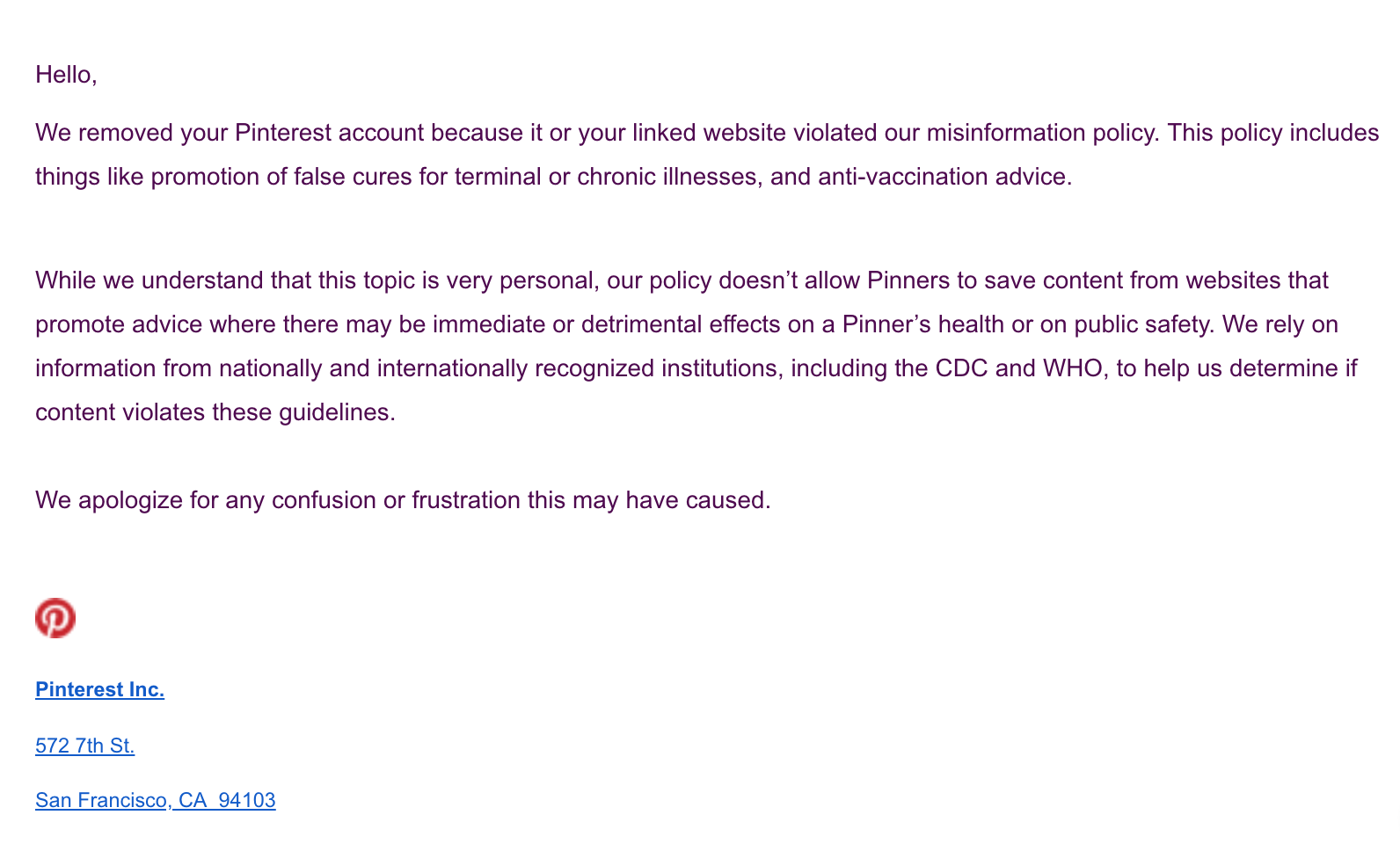Pinterest Bans GreenMedInfo for Posting Natural Health & Vaccine Safety Info
Published December 20, 2018 | Media, Censorship
Pinterest, one of social media’s largest players, is
banning websites like GreenMedInfo which promote natural healing methods
and provide access to peer-reviewed research questioning
vaccine safety.


Note: This article was reprinted with the author’s permission. It was originally published on Sayer Ji’s website at GreenMedInfo.com.
vaccine safety.
On Dec. 13th, 2018 Pinterest removed GreenMedInfo.com, one of the world’s most trafficked and widely referenced natural health research sites, from its platform, stating: “your
linked website violated our misinformation policy. This policy includes
things like promotion of false cures for terminal or chronic illnesses,
and anti-vaccination advice.”
This action occurred after a number of
other sites which either question the safety of vaccines, or are
critical of the vaccine industry, reported similar de-platforming. The
full email is shown below:
We filed an appeal, but given the recent
experience of other natural health and vaccine safety organizations who
have been banned by Pinterest, we do not expect that our account will be
reinstated.
Other platforms who have reported on Pinterest’s censorship include The National Vaccination Information Center (NVIC), Mercola.com, NaturalNews.com, and Health Impact News. You can learn more by reading, Eroding Freedoms: Pinterest Removes NVIC’s Boards, and Pinterest Censoring Anti-Vaccine Doctors and Pins Related to Vaccine Rights.
Pinterest has developed some notoriety for
its poor practices in this regard. For example, the Electronic Frontier
Foundation’s 2018 “Who Has Your Back? Censorship Edition” gave Pinterest a 2 out of 5 stars, citing problems with its Removal and Suspension policies: “Pinterest does not publicly commit to providing meaningful notice to users of every removal and suspension.”
Guilty as Charged?
Pinterest’s accusations of misinformation
(read ‘fake news’) are curious, to say the least, considering that all
of our information on vaccination either reproduces verbatim published,
peer-reviewed literature on the topic of their unintended, adverse
effects, or simply reports on this primary, presumably rock solid layer
of the biomedical literature.
Visit our vaccination research dashboard here to take a look for yourself.
Moreover, Pinterest’s primary justification
for characterizing our research as a threat to public safety is that
the information we provide access to contradicts the CDC and WHO. But
what happens when these very organizations violate medical ethical
principles, such as when in 2014 a senior CDC scientist, Dr. Thompson,
blew the whistle on his agency for covering up data linking the MMR
vaccine to increased autism rates in African American boys? You can read about that here.
As far as the accusation that we are
harming Pinterest users by posting information supporting natural
healing methods, I would argue that the almost 45,000 peer-reviewed and
published studies available on our open access database on the science
of natural medicine speak for themselves. Shooting the messenger doesn’t
make the message go away. Please feel free to use and share this natural health science resource far and wide.
(Note: it took over 10 years and 250,000 in developmental costs to create this free resource)
We believe that it is essential
for platforms like ours to be able to continue to report on these
contradictions and conflicts of interest. Clearly,
Pinterest is not a public institution that guarantees its users basic
civil rights, such as freedom of speech. One could argue that this
therefore exempts them from allowing open debate and the right to
dissent. We do not hold this view but believe that social media
companies should be considered like utilities, and that the open flow of
social media produced and curated information (after all, social media
is by definition produced by the people) is like the water or
electricity these companies regulate. This should afford both
protections and benefits to the providers and the users of platforms
like Pinterest, Facebook, and Youtube. Shutting off the utility,
however, should not be done arbitrarily or for solely political reasons,
as this could be considered an infringement upon our basic rights as
social beings. As Ralph Nader once said, “Information is the currency of
democracy.” Limit its flow, including diametrically opposed views, and
you have removed the condition for the possibility of an open, free, and
democratic society.
Why is this deplatforming happening now?
It turns out that back in 2015 the journal Vaccine published an article titled, “On pins and needles: how vaccines are portrayed on Pinterest,” which
concluded that after analyzing 800 vaccine topic related pins the
majority of the pins—75%—were negative/critical of vaccines. This was an
alarming trend from the perspective of the pro-vaccination camp because
studies from the mid-2000’s on vaccine-related posts on MySpace and
Youtube show they were negative just 25% of the time.
We can only assume that because the
“information war” is being lost on social media platforms, ideological
debate and dissent is being completely banned instead of being allowed
to proliferate in a democratic, open access fashion. In some sense,
therefore, this extreme measure of censorship may actually indicate that
the truth, namely, that vaccines are not a priori safe and
effective in all cases, and that natural medicine can and does provide
viable, evidence-based alternatives to conventional interventions, is
finally getting out to a wider audience.” I think Mahtma Gandhi’s quote
is especially salient given the situation at hand: “First they ignore you, then they laugh at you, then they fight you, then you win.”
Note: This article was reprinted with the author’s permission. It was originally published on Sayer Ji’s website at GreenMedInfo.com.
Leave a Reply